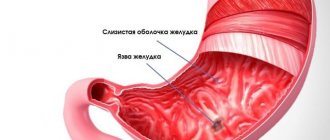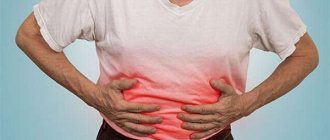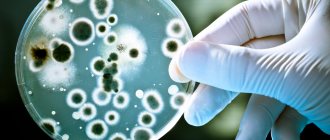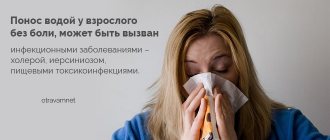Causes of diarrhea along with headache
Diarrhea and headache are the main symptoms of intoxication of the body. The severity of manifestations depends on the patient’s diagnosis. The main reasons for the simultaneous occurrence of headache and diarrhea:
- food poisoning;
- infectious diseases;
- viral diseases;
- intestinal infections;
- pathology of the gastrointestinal tract - hepatitis, gastritis, peptic ulcer, cholecystitis;
- alcohol intoxication.
Symptoms of diarrhea are eliminated after treatment of the underlying disease.
Poisoning
Food and alcohol poisoning is the effect of toxins on the human body due to the abuse of low-quality food and alcoholic beverages. The entry of chemicals into the stomach leads to disruption of metabolism and digestion. Symptoms of such disorders include nausea, vomiting, stomach pain, headache, diarrhea and weakness. With severe intoxication, the body temperature rises and the head becomes dizzy.
Poisoning of the body occurs with excessive consumption of semi-finished products, artificial products, alcohol, and mushrooms. In many cases, the gastric mucosa is damaged, which is manifested by spasmodic pain in the abdominal cavity.
Headache in case of poisoning is a manifestation of general intoxication, and diarrhea is a symptom of impaired digestion of food. Deterioration of the patient's condition requires detoxification therapy to remove toxins from the body.
Rotavirus infection
Rotavirus infection or intestinal flu is an infectious disease of viral etiology. It manifests itself as severe intoxication, metabolic disorders, and inflammation of the mucous membranes. The onset of the disease is similar to ARVI or influenza. The patient develops an intense headache, accompanied by muscle pain and high fever with chills. Dyspeptic disorders occur, and loose stools appear. The disease occurs with general malaise and decreased performance.
The course of therapy consists of the use of antiviral drugs, immunostimulants, and vitamins. Symptomatic treatment – antipyretics, analgesics.
Salmonellosis
Salmonellosis is an infectious disease caused by the Salmonella bacterium. The causative agent of the disease can be contained in poorly processed food products, raw eggs, meat, fermented milk products, restaurant dishes using sauces. The disease occurs with severe intoxication.
Rotavirus infection
Rotavirus infection is an intestinal flu caused by infection with rotavirus. The stomach and intestines suffer, so in addition to the classic flu symptoms, diarrhea and vomiting also occur.
Unlike intestinal infections, rotavirus is infected mainly in the autumn-winter season. The infection can be contracted through the oral-fecal or airborne route. The incubation period can last up to five days. Then the following symptoms appear:
- Diarrhea and vomiting;
- Stomach ache;
- Headaches and sore throat when swallowing;
- Increased body temperature;
- Redness of the laryngeal mucosa;
- Runny nose and nasal congestion.
With rotavirus infection, stool can be up to 15 times a day, the stool is yellowish in color, reminiscent of clay soaked in water. The patient becomes lethargic and irritable.
Since there is no appetite with this pathology, as the disease progresses, the patient suffers greatly from debilitating vomiting on an empty stomach.
If classic flu symptoms are observed, but the patient has frequent and loose stools, rotavirus is first suspected.
But similar manifestations can also occur when infected with adenovirus, astrovirus, or norovirus. The causative agent can only be accurately determined through laboratory tests.
Therefore, if rotavirus or any other virus is suspected, when symptoms of the flu are accompanied by disorders of the digestive system, the patient must be hospitalized.
Diarrhea and headache in a child
In a child, symptoms of intoxication appear with diseases of any etiology. The gastrointestinal tract reacts to any change in metabolism, which may manifest as indigestion. With severe intoxication, the child develops diarrhea. The quantity, frequency, and color of stool depend on the diagnosis.
Headache as a symptom of intoxication is present in any child’s illness. The immune system reacts in this way to disruptions in the normal functioning of the body. Headache with diarrhea is a symptom of infectious and viral diseases, poisoning, and overeating.
Signs of salmonellosis
You can become infected with salmonellosis by eating undercooked meat and fish. The source of the disease can be eggs and poultry. You should not buy ready-made salads in the store, as they spoil quickly. The incubation period can last several days.
After eating foods containing salmonella, the patient experiences the following symptoms:
- Attacks of headache and nausea appear.
- There is mucus in human stool.
- The feces take on a characteristic greenish tint.
- The patient quickly develops signs of fever.
- Active reproduction of parasites leads to brain damage. The patient's kidney function is impaired.
To make a diagnosis, the patient must undergo an examination. After determining the type of pathogen, the doctor prescribes treatment.
Indications for visiting a doctor
The main reason for seeking help for diarrhea is the risk of dehydration and increased intoxication. Contact your doctor if you have the following symptoms:
- dry lips and mucous membranes of the mouth;
- constant thirst;
- confusion;
- rare urination;
- general weakness;
- lowering blood pressure.
The presence of severe pain in the abdominal cavity, accompanied by intoxication, is a dangerous symptom that requires medical intervention.
Features of pain
If you have a headache and loose stools, there may be several reasons. It is important to understand how a headache develops and what it indicates, because these two symptoms often accompany each other.
Pain in the head appears due to irritation of receptors located in the neck. This occurs due to sudden muscle spasms, circulatory problems or vascular spasms. All headaches are divided into:
Primary headaches include those that are directly related to the activity of the blood vessels of the head: migraines, spasms, tension headaches, high or low blood pressure. Head pain that occurs during diarrhea is secondary, as it is considered a symptom of another condition.
You should think about proper treatment if a complex of symptoms appears immediately:
- weakness;
- nausea and vomiting;
- loose stools;
- dizziness;
- temperature;
- aches.
The reasons for the appearance of these several symptoms at the same time can be quite serious, so it is worth understanding them before treatment.
Treatment
What to do if you have a headache, nausea and diarrhea? This is just a manifestation of various diseases. In the absence of fever and headache with diarrhea and nausea, home therapy, plenty of fluids and rest are sufficient. You can use effective traditional medicine.
For vomiting and diarrhea in children, rehydration therapy should be carried out to avoid dehydration. Depending on the cause of the pathology, the following medications are used to treat diarrhea with headaches:
- enterosorbents and absorbent agents;
- detoxification drugs for intravenous administration;
- anti-inflammatory drugs (for gastritis, duodenitis, colitis);
- antibiotics (for bacterial infections);
- antiviral drugs for viral infections.
If the intestinal microflora is disturbed, a sick person must be prescribed probiotic preparations, and vitamin complexes are prescribed to strengthen the immune system and restore the body’s strength after illness.
Treatment of diseases of the gastrointestinal tract is necessarily comprehensive, it also involves following a diet. Clinicians prescribe table No. 4, a balanced protein diet, including easily digestible foods. You can drink a lot of liquid: clean water, unsweetened rosehip decoction, lingonberry or cranberry juice, green tea.
Prevention of intestinal diseases
Poor hygiene can very quickly lead to infectious and long-lasting diarrhea. The disease begins after eating unwashed fruits and greens. When purchasing food from a store, always check the expiration date.
The risk of infection increases when eating raw fish, and river fish are often infected with parasites (opisthorchiasis). Milk purchased from hand must be heat treated.
The source of infection can be spoiled food. Do not use utensils that were used by the patient. Clean rooms regularly using disinfectants.
How to eliminate symptoms?
A doctor will not be able to determine by external signs alone the reason that the patient has a headache, vomiting, nausea and diarrhea. To make an accurate diagnosis, it is necessary to undergo tests. At the same time, if you simply use only symptomatic treatment, you can worsen the disease and cause additional complications.
Remember! Treatment of intestinal infections and food poisoning directly depends on the course of the disease and the degree of intoxication of the body.
Sometimes diarrhea is accompanied by sharp pain. In this case, it is not recommended to use painkillers, since they only alleviate the condition, but do not eliminate the source of the disease. In addition, the effect of the drug can blur the picture of the disease and prevent the doctor from making an accurate diagnosis.
In addition to drug treatment (antibiotics, IVs), for any intestinal disorder, regardless of the cause of its occurrence, the patient must be prescribed a strict diet. During therapy, the patient is prohibited from consuming raw vegetables and fruits and dairy products. All dishes must be boiled or steamed. Juices, coffee, and soda should be excluded from drinks. Maintaining such a diet will allow you to restore your intestinal microflora as quickly as possible.
Therapeutic measures
To get rid of diarrhea, fever and headaches, you need to eliminate the underlying cause of the disease. If the above symptoms are caused by an intestinal infection, treatment should include the use of antibiotics, bed rest, diet, infusion therapy, and the use of symptomatic drugs (Loperamide, Imodium, antipyretics). To eliminate headaches, you can use Analgin, Nurofen, Citramon and other drugs. Etiological treatment is aimed at destroying pathogens. To do this, the sensitivity of microbes to drugs is first determined. For typhoid fever, the following antimicrobial drugs are often prescribed: Levomycetin, Biseptol, Ampicillin. Such patients are advised to eat a high-calorie diet and drink plenty of fluids.
Treatment of salmonellosis involves the use of fluoroquinolones and protected penicillins. Antibiotics are indicated only for moderate or severe forms of the disease.
Treatment for rotavirus infection differs significantly. In this situation, antibiotics are useless. Treatment includes taking sorbents, dehydration, and a strict diet. If a child has diarrhea, it is necessary to exclude milk and fermented milk products from the diet. The temperature should be reduced only if it is above 38.5° C. To reduce the temperature, children under 3 years of age are prescribed suppositories (Cefekon). At an older age, Paracetamol may be prescribed. The dose for each sick child is selected individually by the doctor. When diarrhea is combined with fever, you can take Enterofuril or Enterol. They are indicated for prolonged diarrhea.











